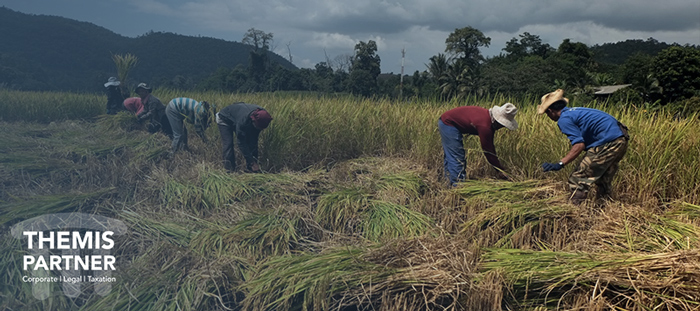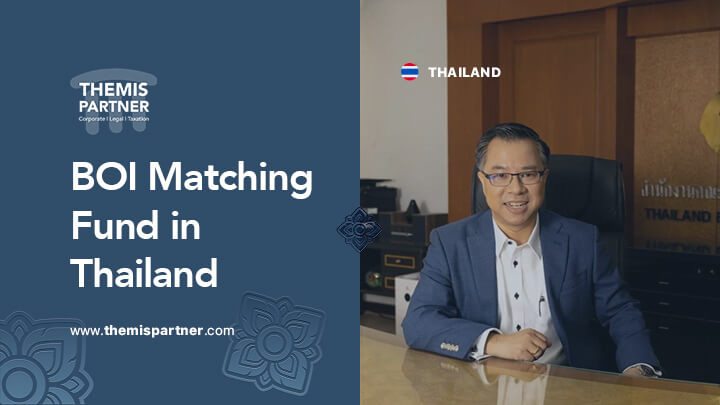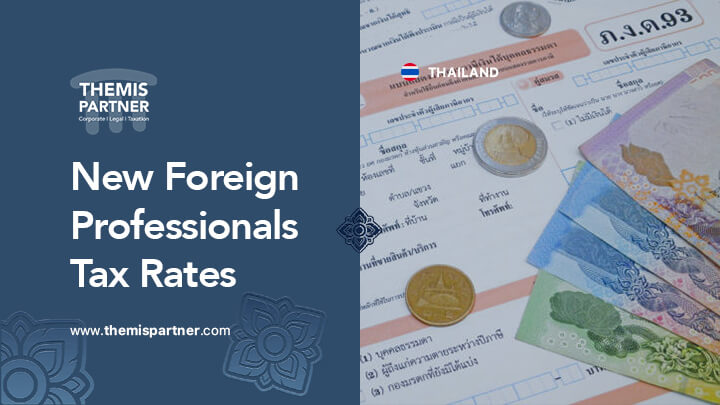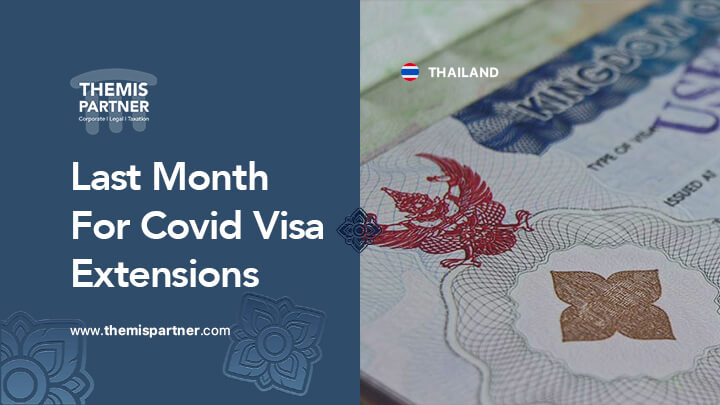The food business in Thailand
The Thai government selected the food industry as one of ten important development engines in line with the “Thailand 4.0” economic model, exploiting its location and local agricultural resources. Food Innopolis, a food-optimized industrial park, was also established by the government.
Abundant Raw Materials
Thailand boasts several competitive advantages in food business and agriculture industries due to vast natural resources, a year-round producing season, comparatively low labor costs, and a competent workforce. Agricultural land accounts for over half of the total land area in the country, enabling for over 80% of raw materials needed in the food industry to be acquired locally at reasonable costs. Rice, cassava, sugarcane, palm oil, coconut, pineapple, and natural rubber are among the top ten worldwide agricultural goods produced by the country.
ℹ️ If you want to start a food business, we advise you to ask a lawyer. This will allow you to follow a simple company registration process and to quickly obtain the necessary documents and licenses for your activity.
Set up a food business in Thailand
Secure your investment with the help of our corporate lawyers
Food Processing
Thailand, which has around 9,000 food processing enterprises, is the leading producer and exporter of a variety of processed foods such as canned tuna, frozen seafood, shrimp, and chicken. Processed food exports account for around 52% of overall food exports and account for nearly 15% of Thai manufacturing output.
Thailand’s food supply is sufficient to satisfy the worldwide market because it is one of the world’s major producers of agricultural commodities. Raw materials are treated to extend the shelf life and quality of finished goods. Thailand exported over 2.4 million tons of chicken and over 200,000 tons of shrimp in 2016, ranking the country fifth in the world for both chicken and shrimp exports. Approximately 70% of poultry production is eaten domestically. From about 1.7 million tons in 2016, this figure climbed by 4-5 percent in 2017. Thailand also provides numerous frozen seafood goods, such as frozen cuttlefish and fish flesh, to customers all over the world.
Moderately Processed Foods
Thailand embraced canning, high-technology freeze drying, and other preservation technologies to increase the shelf life and value of indigenous agricultural and fishery goods. The country is known for being the leading exporter of numerous canned food businesses, including canned pineapple and tuna. In 2016, the country exported more than USD 2 billion in canned tuna and USD 611 million in canned pineapple, making it the top worldwide exporter of both items.
Highly Processed Foods
Thai firms are investing significant resources in research and development to increase production and efficiency in food business, with strong government assistance. Many businesses use computerized technology to control their manufacturing operations. Purchases of processed meals are quickly increasing as a result of changing consumer habits. Ready meals, convenient meat and meat products have shown both strong domestic and export demand.
Ready Meals
The key drivers of Thailand’s double-digit ready meal growth rate are urbanization and increasingly hectic lifestyles. Thailand is a prime production base for ready meals, in addition to the growing local demand. With a 12.4 percent annual growth rate, export value reached USD 167 million in 2017. In 2016, the country was the world’s ninth largest exporter of ready meals, with a market share of 3.7 percent. In 2017, the value of local consumption exceeded 270 million.
Processed Halal Foods
In the last several years, the demand for halal cuisine has skyrocketed. In 2018, the global halal food business was worth USD 1.6 trillion, accounting for roughly 16% of the overall global food market. Thailand currently ranks 13th among the world’s largest halal food producers.
Thailand is considered an ideal investment destination because it is surrounded by countries with large Muslim populations. Singapore, Malaysia, Indonesia, Brunei, the UAE, Saudi Arabia, and Egypt are the country’s major export markets. Thailand’s halal food exports were valued at USD 5.8 billion in 2016, with an annual growth rate of 8%.
Over the last 68 years, Thailand’s halal certification standards have evolved. Currently, over 8,000 factories and over 150,000 products have received halal certification. Furthermore, the Thai government has prioritized halal foods by developing a five-year plan (2016-2020) to position Thailand as one of the world’s top five exporters of halal products. More than USD 11.5 million has been set aside to improve halal food businesses in Thailand.
Food Seasoning
Thailand’s expertise in food business processing have propelled the nation to the forefront of the seasonings and ingredients sectors. Thailand’s food ingredient exports totaled USD 616 million in 2016. Thailand is the world’s sixth largest food seasoning exporter, accounting for around 5.4 percent of the market, with over 550 firms. 1 Australia, the Philippines, Indonesia, Japan, and Malaysia are the leading export destinations. Furthermore, there is a local need for food flavoring.
High-tech Food Ingredients
As the world’s top supplier of cassava products, the nation shipped almost 11 million tons worth USD 3 billion in 2016. Cassava starch is found in a variety of items, including breads, frozen meals, and sweets. By putting research and development first, the country is quickly becoming a major producer of innovative food components such as artificial sweeteners such as maltitol, crystalline, sorbitol, and high-quality mono- sodium glutamate (MSG). Leading multinational firms produce their food ingredient goods in Thailand for export back to their home countries as well as the global market, using a range of raw materials.
Beverages
Beverages are likewise regarded as a significant sector in Thailand. In 2016, the country’s non-alcoholic beverage market was valued around USD 7.9 billion, with a 5.2 percent CAGR and a USD 1.1 billion export value. ASEAN countries such as Vietnam, Cambodia, and Myanmar are the top export destinations.
Functional Drinks
With growing demand for premium products, Thai consumers are looking for more-sophisticated flavors and are increasingly concerned about their nutritional intake. They are therefore more willing to pay for products with better functionality. As a result, functional drinks are enjoying increasing popularity among Thai consumers. This market was worth USD 1.6 billion in 20163 and is expected to grow as consumers focus on their well-being. Collagen and hyaluronic acid are among the ingredients being added to beverages for functions such as improving the skin’s smoothness and delaying the aging process.
Fruit Juices
Thai customers are searching for more nuanced flavors and are becoming more concerned about their nutritional consumption, since there is a growing demand for luxury products in food business. As a result, they are more prepared to pay for things with greater utility. As a result, functional beverages are gaining appeal among Thai consumers. This food industry was valued USD 1.6 billion in 2016 and is predicted to expand as people pay more attention to their health. Collagen and hyaluronic acid are two chemicals that are being added to beverages to improve the smoothness of the skin and to slow the aging process.

Opportunities in food business
Thailand is aiming to assure the highest quality of foods for the worldwide market by using new technology and food standards. In addition, the government is pushing a program centered on living a healthy lifestyle and maintaining optimal physical and mental health.
Healthy Foods
Healthy cuisine have become popular among many Thais as a result of global trends. Thailand’s local consumption value for healthy foods increased by 6.7 percent to USD 5.3 billion in 2016. The government is continuing to support this fast growing food business by offering a combination of tax incentives and research funding to guarantee that the country’s food manufacturers produce high-quality products that benefit both customers’ health and the environment.
Organic Products
Organic foods are a new but rapidly growing market in Thailand. Consumers are growing more knowledgeable and aware of the benefits of organic foods. Organic agriculture is practiced on over 300,000 rai (118,610 acres) in Thailand. In 2016, Thailand’s organic consumption was estimated at USD 15 million. Organic rice is the most important industry, accounting for 65% of the entire organic food market. From 2011 to 2016, organic coffee and green tea had the highest growth rates among drinks, at 8.9 percent and 7.3 percent, respectively. Thailand’s organic products are exported and sold in several well-known worldwide grocery chains and organic-focused merchants, including Whole Foods Market and WalMart.
Dietary Supplements and Medical Foods
In 2016, Thailand’s sales of dietary supplements and vitamins increased by more than USD 1.6 billion, attaining double-digit growth of 11%. More Thais are adopting a healthy lifestyle, and a rising number of customers are beginning to care for their health at a younger age. This industry is also seeing significant expansion as a result of the growing aging population. In 2050, the number of persons aged 65 and up is predicted to reach approximately 1.5 billion. According to a United Nations assessment, by 2030, Thailand’s elderly population would account for 20% of the overall population.
In the same way that supplements serve as preventative medicine, medical foods are designed to cure illnesses and disorders ranging from asthma to diabetes. Thailand’s medicinal food sector is growing. Many major worldwide firms, like Mead Johnson Nutrition, Abbott, Novartis, and Thai Otsuka, operate plants in Thailand. This sector immediately benefits from Thailand’s medical services industry’s world-class reputation, since the country draws over two million overseas patients each year. Some firms, such as Thai Otsuka, saw double-digit revenue increase in 2016.
Healthy Fats and Oil
With an abundance of high-quality raw materials, a variety of premium healthy oils, such as rice bran, sunflower, and coconut oils, are being created to suit the market. Thailand is well-positioned as one of the major competitors in the worldwide rice bran oil market, with a total annual production capacity of 54,500 million tons, thanks to substantial government funding in research & development. Rice bran has a high concentration of omega fatty acids, which enhance cardiovascular health. South Korea, Australia, and the United States are among the top export destinations.
Supporting Industries
Food machinery and equipment
As one of Asia’s top food producers, the nation is always inventing cutting-edge technology to fulfill the world’s ever-increasing demand. In 2016, the value of food processing machinery imported into Thailand exceeded USD 201.2 million. In addition to being employed in the manufacture of food seasoning, the country has strengthened its capacity and world-class safety standards in food machinery and equipment encompassing all processes involved in food business production.
High Value-Added Food Packaging
Thailand has pro-actively implemented new technology and regulations to boost food business production that assures safety and quality, aided by a supportive government. Thailand is home to numerous renowned Japanese, American, and European food packaging firms, including Amcor, Huhtamaki, Majend Makcs, and Sealed Air, with over 2,000 food packaging manufacturers. To maintain its position as a world leader in the food processing sector and to adapt to consumers’ changing lifestyles, Thailand will continue to prioritize convenient, safe, impurity-free, functional, and eco-friendly designed food packaging.
Digitalized food service
Comprehending Thai culture begins with understanding the Thai cuisine culture. Thais are quite receptive to embracing and incorporating many types of meals. With the country’s qualities and the advancement of smart technologies, tech-savvy entrepreneurs have discovered methods to combine technology and cuisine, producing new restaurant suggestions and delivery applications. Several start-ups have been acknowledged for their innovative approaches to offering food services, ranging from restaurant reservation applications, healthy meal and grocery delivery services, and cheap daily offers at restaurants. The online meal delivery sector was worth USD 791 million in 2017, representing an 11% increase over the previous year. To no one’s surprise, Thailand continues to be ahead of the curve in terms of cuisine and technology.
Why choose Thailand in the food business?
Abundant Raw Materials
Thailand is well-known as an agricultural powerhouse, with an abundance of resources from land to sea and a growing season that lasts all year. This highlights Thailand’s capabilities as a producer of basic materials such as cassava, sugar, rice, and palm oil, which are used in both the domestic and global food industries. With its low pricing and excellent quality goods, the country is equipped to lead the world’s food sector, allowing food processing businesses to acquire more than 80% of the raw materials required domestically.
Strategic Location with Excellent Logistics Networks
Thailand, located in the center of Southeast Asia, is linked to ASEAN and other nations. With over 640 million consumers in Southeast Asia, the food business faces a slew of new challenges. Suvarnabhumi International Airport, the Laem Chabang deep sea port, and other commercial routes enable the country to quickly connect with various places for shipping and delivery of its food items.
Competitive Workforce
International enterprises benefit greatly from a rising pool of knowledge mixed with a bright Thai workforce. As a result, among many large multinational businesses such as Cargill and Mckey Foods, Thailand is well-known and well-regarded as the world’s top destination for labor-intensive food manufacturing. In Thailand, the food sector employs almost 1.1 million people.
To boost competitiveness even further, the Ministry of Labor created a strategic framework and plan for the health care and food industries from 2018 to 2022. This strategy is intended to result in the production of around 9,600 food scientists, researchers, and technicians. This key market is expected to employ up to 126,600 food specialists if completely deployed.
Strong Government Support
World Food Valley Thailand
Thailand’s governmental and commercial sectors are collaborating to begin the first phase of the “World Food Valley” project, which would encompass 2,000 rai in Ang Thong province, with the goal of attaining an export value of USD 58.6 billion by 2036.
This significant project will provide infrastructure and comprehensive industry development services such as raw materials and quality control, testing, approval, and mentoring services, resulting in the creation of an ecosystem for the food industry that will bring together all levels of the value chain in one location. Numerous investors have shown an interest in investing in the Food Innopolis mega-project. Food Innopolis opened at Thailand Science Park in 2016. It is a fully equipped facility with a total area of 124,000 square meters that includes both wet and dry laboratories as well as a variety of accessible resources such as:
| ➤ Over 3,000 highly trained food scientists |
| ➤ 10,000 students studying food science |
| ➤ 150 laboratories for food research |
| ➤ Twenty pilot plants |
| ➤ 11 Food and Agriculture-related enterprises at significant universities |










